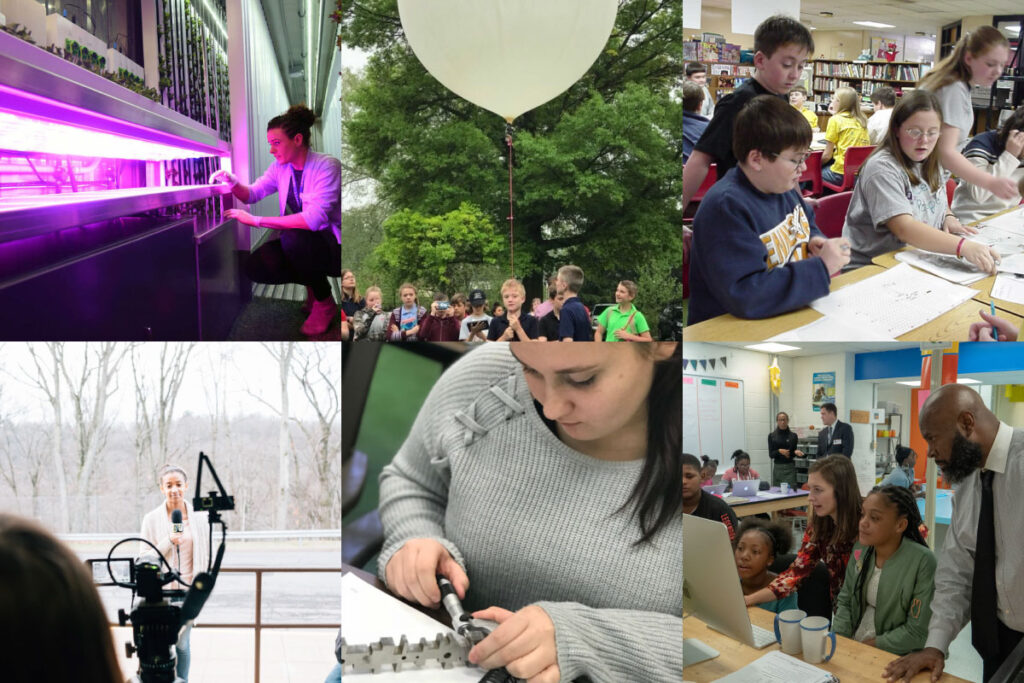As Remake Learning’s Rural Outreach Coordinator, I had my eye on innovations submitted to the HundrED Spotlight on Pittsburgh from outside Allegheny County. Rural network members really showed up for the Spotlight! I’m pleased to share some of the amazing work that these educators are doing.
Educators in rural communities share much in common with their peers from the cities and suburbs, but they also have their own distinct opportunities and challenges as they work to create more engaging, relevant, and equitable learning opportunities. Without a doubt, there are rural communities all over the world that could learn from the work happening here in southwestern Pennsylvania and northern West Virginia. And many of the innovations you’ll find could be scaled or replicated powerfully in a wide range of contexts!
Another common thread in my work with rural communities is innovation in the context of very small schools and districts. Many small schools are tight-knit and serve as centers of their community. They also face unique obstacles, including limitations in space and resources. There’s much to be learned from the work happening in small schools and districts in our region.
Educators in rural communities and small schools are doing amazing things to help students learn, grow, and flourish in southwestern Pennsylvania and northern West Virginia. Here are my favorites from the HundrED Spotlight. Whether you’re an educator in a rural context or a small school, or you’re just looking for powerful examples high-quality education happening here in the region, these innovations are worth checking out:
Inspired by an exploration of solutions to global food insecurity, students and teachers at West Greene School District established a solar-powered aquaponics ecosystem.
Through data-driven interventions, the Penn State Talent Search Program helps thousands of students from high-need districts enroll in post-secondary education.
Sometimes transformative change begins by updating what already exists. Duquesne Elementary School transformed its existing building to meet the needs of its students in grades PreK-6, even turning a storage room into a maker space.
Trinity High School students are growing food in a hydroponic facility that combines curricular concepts with community service—using agriculture, chemistry, and biotechnology, students grow vegetables and herbs that they donate to a local food bank.
Through a partnership with a local manufacturing firm, students at Butler Area School District are learning 21st-century skills in a real-world career setting.
School leaders at Wheeling Country Day School developed a culture of possibility in innovation that has empowered educators and students to reimagine what’s possible together and unlock the potential of their teaching and learning.
The Challenger Learning Center of Wheeling has been using technology for 20 years to deliver live video-conference simulations of space and medical adventures to classrooms all over the world. e-Missions immerse students as scientists, astronauts, and doctors working to save lives.
The aquaponics program at Avella Area School District is a project-based learning environment that incorporates agriculture, fish culture, and nutrient cycling.
Students at Cornell High School are responsible for live streaming their morning announcements, rotating roles and responsibilities.
Can making help students with mental health diagnoses learn? At Intermediate Unit 1’s Fab Lab, students diagnosed with mental health conditions are designing, prototyping, building, and learning.
At Hampton Middle School, students are developing a global perspective by using the UN Sustainable Development Goals to design their own solutions to real-world problems.
At Trinity Area School District, students build and race underwater rovers to explore marine architecture and ocean engineering principles.
Born as a cross-curricular project between English and Social Studies in 2016, this student-built and -maintained a website from Kiski Area High School tells the real stories of veterans from the community.
There are amazing things happening in the rural communities and small schools in the Remake Learning network, and this list makes me proud to call the region home. These innovators took the time to share what they’re doing, and I’d strongly encourage you to read what they have to say! If you want even more inspiration, you can explore all 82 submissions here.
